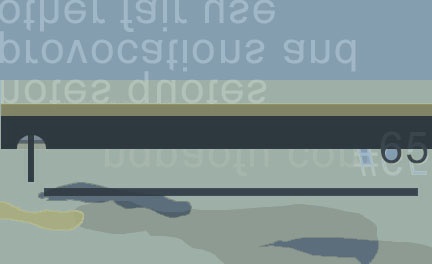

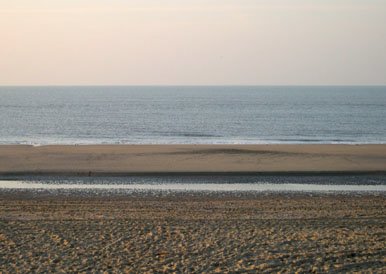
|
under this North Sea beach: my past
13 February 2003
geestgrond (sandy soil along the foot of the dunes)
For dinner is small sole at the Duinoord Hotel and Restaurant in the Wassenaar sand dune landscape, near the Wassenaarseslag North Sea beach. Today's 554 km GOGI round-trip (for comparison: Maastricht-Moulin one-way is 575 — that's for tomorrow) takes me from Maastricht to Amsterdam and Aerdenhout, onwards to Den Haag, which via Hillegom, Katwijk and Valkenburg passes me by the Wassenaar junction. I can't resist a short detour into my town of birth. Turn right, up the Klif high dune in which' descent the landscape rolls towards the sea. After the beach at the Duinoord, marine base Valkenburg airborne DC3s fly over very low. Their hum brings me back just like the sea reflected light over the beach in its filtered winter brightness.
The off-season Duinoord hosts several small parties and discussion groups. Just to eavesdrop on other people's conversations in the lounge brings about a sublime state of idleness. Counting the lives, one, two, three, four, five... for stories so familiar they could be taken from your own life.
|

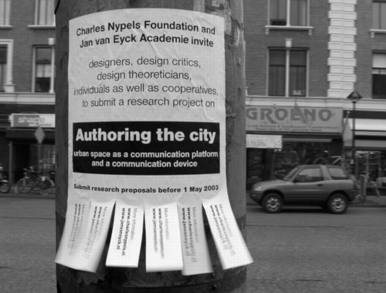

12 February 2003
just in links out
My first trip to L. in 30 years has been planned for 11-13 March. Relevant links include Maarten de Reus' site, whose Dutch homepage was in true minimalist tradition a no-link XL scan of his calling card, now largely improved (hey, he's even got links!) for his expat status. Even google goes there straight. Where'll be: the New Typography symposium. More people I'd hope to see include e.g. ex-researcher at JvE Sara De Bondt. A propos JvE, the Charles Nypels Grant site is up with its Authoring the City call for projects. Check it out if you know you're way around.
|

10 February 2003
The key to everything: surround people with real things not with ghosts.
(Tomás Maldonado c.s., 1946)
meanwhile
We're closely monitoring two sites for CHnow conditions: a slope right above the apartment and a map of our Villars/les Chaux area between Lausanne and Sion.
underhyping the Internet
MacCalligraphy... need I say more. 10 hits at a google.search sufficed to bring it back to me, courtesy Ryan Summers, who was the least obscure ("Help! I am looking for MacCalligraphy") of above hits and also looked for this underhyped Macintosh classic software that made me sort of calligraph, a while ago.
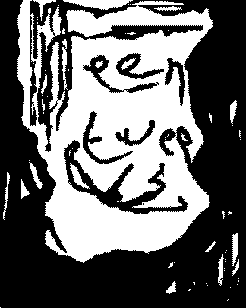
een twee val ('one two fall') 1994?
|

8-9 February 2003
Piper sit thee down and write
In a book that all may read
(William Blake)
more water stain'd
The idea of the graphical is to scratch the surface, a graphein or carving aimed to increase contrast, in order to stand out a sign for us to read. Like when using the hollow reed, after staining the water, our plot-by-blot constructs information to contrast noise. Increased contrast challenges blur. Also immersive symbolic orders need to offer contrast in order to enhance a signifying process. Not everything is (sufficient) contrast. It must happen not only at the visual level, where the graphical comes in handy, but also at conceptual and rhetorical levels. However there are no 'empty' signs, lest there are 'open' ones, there is plenty visual and other sensorial noise out there, which is exactly conceptually or rhetorically, and even economically, insignificant — not worth the highlighting.
different rubs for different hubs
Learning to see (or in the case of the creative person: to plot) contrast on a visual, conceptual and rhetorical level builds the ability of interpretation, furthering narrative strands conditional to intervention in the read/write arena. Rubbing the illusion is one aspect of the original graphical recalcitrance. (...) Argentinean artist and designer Tomás Maldonado in his 1946 Inventionist Manifesto held:
|
Representational art tends to muffle man's cognitive energy, distract him
from his own power.
The raw material of representational art has always been illusion.
Illusion of space.
Illusion of expression.
Illusion of reality.
Illusion of movement.
A formidable mirage from which man has always returned disappointed and
weakened.
|
Looking through the sign (enjoying the illusion) (partly even more because) at the same time looking at it (experiencing it interrupted, to see the techne work), and toggling between these two states of reading, today is the finest challenge to the 'power of cognitive energy'.
Rhetoric links at Enculturation.
Lifting from pervasive reality, immediate reality, everyday reality, life, the world, you name it — the application of a trick, a translation, to isolate/concentrate our experience in front of a model reality, included in and separated from that first reality — to scribble or bricolage or knead an isolated, though not completely disconnected, ideal object or image or text, which is tributary both to the contexts of its tradition as to the new context which firstly comes about around it (Elliot's 'tradition' and the individual talent)... feeds our experience. Liberated from utility and commodity (- economies, - ecologies, - production, - identification, - ritualization), by force of a read/write intervention, an act upon raw material (stuff and ideas, building blocks and suppositions), a choice from all which is not the new construct which we are investigating here, the contrasting sign — that aesthetic moment of separation and connection, from all which went before, goes on around it, or will happen without any connection to the present manifestation — outside of all which neither has now or will ever have anything to do with our object of attention and investment — that singularity is what we are here for.
It's the way we swing.
|
When for example we break out a) kitchen, removing all objects which equip two rooms, some of them plugged into networks, their removal demanding the taking down of the constructions which supported their purpose in the kitchen and toilet, preparing a new largely improved (bigger! lighter! more open!) two-into-one room for use as a more all-round utility, at some moment it nears that very status of the 'ideal' (remember Flusser's impossible ideal cabinet) space, or object. The dismantled room, just like any (im-)mediatized exotic place where one might find oneself, can carry that meaning and support the fancy of pure possibility, until its suggestion disappears for the next one, or — in the case of my kitchen — for its aimed at use as a mechanism and site for a specific production and the sociability which comes with the manufacture of food and meals, within the specific context of the Moulin du Merle, inhabited by our family in the early 2000s.
|
...and volume
With Contrast for information, also information and communication markets need Volume for communication — Contrast the Plenty: the bottomline of any 'market'. Mass must be, even if in the shape of 'mass customization', or faux-identity: petty contrast for the petty consumer. The kind of contrast which produces most information, a distinctive difference for each and every one consumer whoever, is at principle conflict with the market's volume creed. Emancipation means to contrast mass-individualized consensus identity. Emancipation is not where markets lean.
Accidental relevant link: Marc Faber's gloomboomdoom.com after having incidentally watched television for half an hour tonight, dropping into VPRO's Tegenlicht, where Faber discussed the world economies with Jim Rogers and Daniel Yergin. Global economy will go where is the volume: China.
|

7 February 2003
today
Too early to tell. Off the record: repeated searches lead me back home. Or: the more you search the more you search — in the closed loops of one's attention horizon.
rubbing
The graphical rubs the immersive.
Informed link (found on Google search - "symbolic order", graphic ): calligraphist Stefan Artemi (calligraphy has always been on the horizon of my interests being such a rich and important skill).
Also: William Blake's Songs of Innocense and of Experience ("The Man who does not know The Beginning, never can know the End of Art"), via William Blake Concordance.
and I made a rural pen,
and I stain'd the water clear,
and I wrote my happy songs,
every child may joy to hear
|

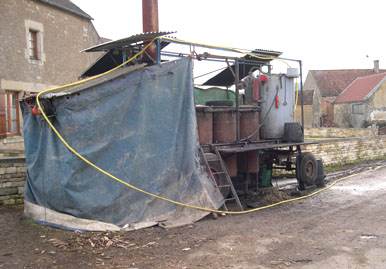

the wood fire heated ambulant distillery
posted at La Pouge, waiting for everybody's fruit

6 February 2003
et si omnes ego non (sez portal on Murano, Italy)
use less waste less
Another useful day. Guy picked up the car which broke down on its distribution belt or something. While warming up in the garage. Apparently I am lucky not to have been speeding the highway when this happened. Lack of maintenance has to do with it, so reminds me Derk, who knows his cars. Honorine and he, who sent me Guy, came around and stayed to take down the loo-in-kitchen and its supportive wall, which means now we have this one really empty kitchen ready to build and one loo left on the first floor, or second floor to some of you. Imagine our confusion. G. and myself have almost agreed on how to set up sink. It's only a matter of months now.
Meanwhile, I completely forgot to call the bank. We went to see the mobile alambic, where we will have distiled the 150+ litres of prune juice that have been fermenting in the cellar since last fall leaving this fruity olfactory trace, into a superb goûte de prune, or eau de vie.
|

5 February 2003
I don't see art work (essentially the art object) fundamentally question itself in art production since the 1980s. I do not find any indecision as far as its right of existence in an art context — or on an art context's right of existence for that matter. OTOH there's plenty legitimation of art-in-other-contexts — as art, as something skilled artists do, contrary to what non-artists do. Fine arts have emancipated from an other- and outer-worldly position to be included in 'the media'. Art's final destination is the media. Or, some 'art' has migrated somewhere else where for the moment it is less visible, or where we dare not look, or where it is right in front of our eyes but we fail to recognize it in its new appearances.
Then there's pre-'mass media' art, a museo-historical category, well catalogued and labelled. But not native to a media age. Debord's 'old buildings and books'.
Art's reproduction is not technical, but informational, since at least the 1980s, while precursors can surely be found. After all, finding examples, or proof, is simply a matter of adjusting ones lenses. Focus is a favorable construct.
Mass media direction and main promise is to be as democratic and popular as technically and economically feasible. It's an extreme industrial means of production, whichever way you regard it.
Maybe we're losing fine art as a splendid read/write faculty and are left deciphering and coding from and for and catering to a mass mediated everyday until otherworldly powers incarnate in yet mysterious venues.
ps.: No friction? No contrast? 'We' cannot blame the 'object' or 'artist' for a lack of interest in friction? Rubbing what against what exactly? Different rubs for different hubs. Meanwhile what becomes of the category of the useless and its great tradition? I loose interest as soon as art inspires use.
|

4-5 February 2003
(2:22, Cioran's entry in his Cahiers, at the message of his mother's death, a telegram under the door, fills my eyes: Tout ce qu'elle était s'est aggravé et exaspéré en moi. Je suis sa réussite et sa défaite.). The good son: it's not about him.
tic toc
Terror of the hyperlink. Escapism. Time and again.
jo jo
Terror of software. Process no end. Closed loops.
|

3 February 2003
Un manuscrit est achevé quand toute amélioration qu'on y apporte n'est en fait qu'une anti-trouvaille.
(Cioran)
heardy-geardy
Further mining of a body of work that does not exist and was on 10 year hiatus — but does, and wasn't: just footloose in informational drift, over 1993-2003. There's a continuous fascination with the graphical, which fundamentally is a love of reading-as-deciphering, writing-as-encoding, images and text in a parallel reality, as separate from the first reality as much as related to it, two-way conditionally ('tributary'), through that wonderful read/write faculty which we (yes, um, indeed: us humans) have, and cultivate, relate our existence by its means. I want my media flat. I want my media to be that which separates while it connects, and vice-versa. I want discretion for my media.
|

1-2 February 2003
11 octobre — J'ai cherché inutilement, pendant deux heures, boulevard Lenoir, deux robinets pour la cuisine, vieux modèle, hélas! — Des commerçants, impolis jusqu'à la provocation. Visité le marché aux puces dudit boulevard. Fatigue, écoeurement: comment a-t-on pu réunir tant de monstres sur un espace aussi étroit.
(Cioran)
everyday humors
In the everyday, most experiences I have to learn to deal with and to act upon on the basis of physical properties and behavior — in the interaction with material and process, and people: how does wood cut, how does a fire light up from wood or gas, how do vegetables prepare and cook, how do chickens eat, how does a tree prune, how does snow melt, how do cats give birth, what do artists do? How to assist these processes? When four years ago we left the center of Amsterdam for the isolated calm of the French Nièvre ('moving there yet is a radical break from where your reputation is, where your income is and where you know the rules') I entertained myself and others with the idea that I left the everyday problems of societal life in the pre-occupied
territory, for the real problems of house keeping. How did I know? Could we afford this move?
|

roadside humors Ardennen 30 January 2003

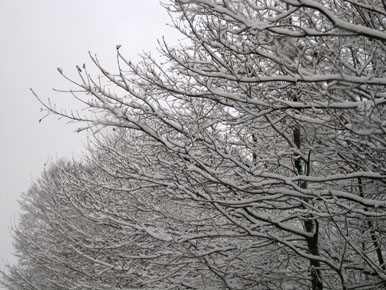

31 January 2003
Ce que je vois m'aveugle. Ce que j'entends m'assourdit. Ce en quoi je sais, cela me rend ingnorant. J'ignore en tant et pour autant que je sais. Cette illumination devant moi est un bandeau et recouvre ou une nuit ou une lumière plus... Plus quoi? Ici le cercle se ferme, de cet étrange renversement: la connaissance, comme un nuage sur l'être; le monde brillant, comme taie et opacité. Otez toute chose que j'y voie.
(Paul Valéry)
two humors
Look over here. Look over there. Shine your light over here. Shine it over there. More over here. More over there. Humor and temperament: temperare the umori.
|

30 January 2003
Tu es plein de secrets que tu appelles Moi. Tu es voix de ton inconnu.
(Paul Valéry)
you can be serious, ease mistaken
Forgot when exactly I wrote this, and in what particular mood, but I forward it here, a serious note to self. As a forgotten 1Book Word file it bore a title which I will soon be using for a rather optimistic and constructive event, so I better empty out before I start over:
|
let's take individualization serious for a change.
like: the condition of an information age.
does this mean loneliness and social disintegration?
of course not.
does it mean egotism to the max?
of course not.
does it mean everyone is glued to his or her individual consumer profile?
of course not.
why do we then meet this fear so often?
because individualization is not taken serious.
not by the media industries: not by the communication channels, not by the content providers, not by those in cultural production — like artists, designers, theoreticians — like you and me, like the rest of us.
we don't take individualization serious.
we don't take the consumer-producer shift serious.
we don't take information production serious.
we don't take new media serious.
we don't take new distribution patterns serious.
we don't take downloading and uploading symmetry serious.
|
'Not yet', I am tempted to add today. Because 'you can't be serious'? 'Of course not'. But serious takes a while to settle. Let's take it easy. We barely know what we are looking at and talking about, while producing its information — whatever it is, it suffers more from optimistic and pessimistic over-definition, than from a lack of constructive loving attention. But we're not all building the same darn thing. We're bricolaging our own stuff with all that 'information': departing from the same hang-ups repeating the same mistakes over and again, loosing some in the process and celebrating new ones as serious insights into the nature of the new new. Meanwhile we're individually and collectively seriously slow, that's what's most serious and most shared and most comfortable. We is always building what we knows, not knowledge new.
Then, with any 'we', read 'me', the author. Mea flippin' culpa. We's pretentious shit. The author's only to blame for 'we', less for his or her observations. Let us not take the 'we' of the world too serious, shall we?
Where was I? Temper, temper, nothing but a balance of humors. Still can't believe how lucky I was getting those boxes back. Not that I would have long mourned over their loss. I even imagined a happy modelling cambrioleur...
What I really love is unexpected and unlikely things to happen. That's my information. Change from the written paths. A sudden look behind the rusty cannons of the world's parks.
the rest of us
To whom it may concern: Bahasa Indonesia knows two different forms for 'we': the one including the addressee(s), the other excluding him or her: 'kita' and 'kami'.
|

Maastricht, 29 January 2003
Hiya Quasime,
NL's a different treat altogether this time around. I find myself planted in the canteen of the Carglass workshop at the Fregatweg with too much of their free coffee at hand and my car waiting for a new right front window to arrive from Heerlen with a courier delivery service. www.hollandkoeriers.nl says their van, but they're late. I had an appointment at 2:15 pm, they arrive at 3:05. My car got broken into two nights ago on the Hertogsingel. A bottle of 2001 Côtes du Rhone Médaille d'Or and three small wooden crates containing three art objects are missing since. Imagine the perpetrator's face when s/he opens the crates, possibly expecting more bottles. The 1991 pieces (editions of /3 multiples, fortunately) consist of yellow modelling wax plates, silk-screened in black with a line drawing showing three different scenes of freak anomalies from medieval sources, surrounded by the words Gibberish, Faselei, Amphigouri, Wartaal... to be exhibited in Aerdenhout later this spring. The cases carry my name, and 'this side up', 'keep cool', 'don't expose to direct sun light', '1991', 'Wartaal' and such, in black felt pen handwriting.
|

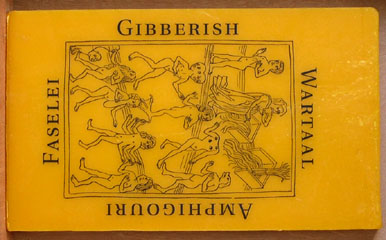

Otherwise progress was booked in the conception of JvE web publication hosting. I schedule it for the coming 5 months to be detailed out and offered/commissioned for launch in September/October. Meanwhile a faster connection and the 1Book worked well together for me, downloading Fiona Apple, Natacha Atlas, DJ Cheb i Sabbah, Tabla Beat Science, Nitin Sawhney and more, like Spiritualized, who I'm rediscovering, also suddenly remembering that incredible concert in Montréal at the Spectrum (remarkably I only shared here how lucky I was to be going there, never reviewing the formidable guitar line-up based wall of sound after). As also Willem van Weelden recently remarked: file sharing music mining plays tricks on our memory: while playing, searching for artists, genres, songs, one reviews ones own melomanic history.
(...)
Really, Q., of all the unlikely things to happen this day!...
Thuur comes calling after me when I enter the Academie, returning from Carglass. My three pieces were delivered back, only one crate was opened, not a screw missing from the lid, the untouched tablets embedded in their styrofoam as if a curator had just prepared to mount them but was called away for a more pressing task, or went for her soft white gloves. Holy gibberish. Grand piano. A Mr. Heynen found my works in the Stadspark, behind the Old Cannon, less than 500 meters from where they had been stolen from the car. He somehow remembered my name from an art context in which he is 'acquainted', as he tells me on the phone. After a few calls a colleague tells him that I work at the Jan van Eyck, where he then takes the boxes. Next time when I'm over Mr. Heynen can expect a small wooden case with a couple of Medailled bottles!
In the spirit of celebration I treat myself to a good early Indonesian meal at De Branding (T 043 3217806). On my way to the restaurant I buy Geleend en uitgeleend, Nederlandse woorden in andere talen & andersom, and More Work for Mother; The Ironies of Household Technology from the Open Hearth to the Microwave. Finally Wilco, and Diana Krall, over major cut-'n-paste in the evening hours. I mean: substantial. Dream a Little Dream.
|

25-26 January 2003
work encore
Soon at the JvE we'll take up web hosting thanks to the €45k subsidy request granted by the Mondriaan Foundation. This service will start from 1 July 2003 as a simple facility for current research at the institute, as well as benefit ex-researchers who desire to continue publishing projects with a friendly host after their research period. At the same time it allows the institute to keep track of its alumni if they are into developing this kind of media usage. I see the service in the first place as a 'context' — which might seem odd: with the average website's ease of click-out little contextual stability can be expected, or can it? And JvE doesn't demand any banners, either.
context en core
Context mutuality (mutual contextuality — can you imagine it any other way?) means an object embedded in a context and that context hosting the object. Context mutuality is a contract — a dialogue, two-way promotion. Hey, it's a rare condition, you don't have to tell me. Context mutual interest is win/win, or grin/grin, skin/skin, cling/cling, ding/ding. Whine/whine too. To develop a hosting service means developing such a context, not as a simple service.
Minimal context can be in a contract with a host. If that host, apart from being a good deal economically, has an agenda of conservation, and research, the promotion of products as material, to continue inquiry in specific fields, like authoring and publishing, if that host as a context has an interest in the objects it serves which goes beyond tracking sentimental histories or its own identity as a facility — if conditions are more critical, add more value to the identity of that institution and the publication itself, then I would prefer it to host my own sites over n'importe any trustworthy anonymous commercial service provider. As soon as the JvE service is up I'll move my three sites there (and start a couple of new ones if I'm unlucky...).
conservancy and innovation
JvE web publication hosting would be a platform and conservancy. Actually I would like it to invest in electronic publishing, in the way any publisher invests in its authors, by providing financial means, technical opportunity and contextual relevance for the objects it publishes. If the book medium can and should still be innovated, the infant medium for networked hyper-authoring publication will pass through stages of development which in the end could define genres and build bodies of work and libraries of knowledge and art.
If JvE would develop a specialism without narrowing down into ideological dead ends I would promote it to be a publishing research institution, with a generous agenda for who publishes what, when, for all communicational transactions in an informationalizing society — from how one manages his or her personal profiles and preferences in relationships with commercial and governmental institutions, to how it re-organizes educational and research curriculums, to how we develop publishing technologies and found 'publishing houses', including emergent genre survey, main stream media journalism v.v. information grazing news gathering, intellectual property intricacies...
'Publishing' being how the world's cultures will advertize for the decades to come, publishing meaning fierce competition for attention at any scale imaginable, inviting all kinds of conservatism and provincialism to arise against free traffic and open exchange, an international cultural institution to research publishing in all its opportunities and responsibilities is requisite.
|



24 January 2003
attachment
Above 'course' was sent to me as an attachment, of a lost email, probably deleted. 28.016.446 bytes of such 'attachments' reside on the 1Book's hard disk. Could I delete all just like that? I don't need the space but it bothers me like spam. The course's ok but they won't be al that good I bet.
|

23 January 2003
populus
A long television night does not bring us the politics we would prefer to see for NL. 'Way over yonder in the monarchy, there ain't nobody that can sing like me'. Labor has its comeback gaining 19 seats to reach 42, but the Christen Democrats stay the biggest faction at 44, so have the initiative and the prime minister position. If I were Wouter Bos I'd take the opposition side with the Green and Socialist parties and work hard to see the Christen right(eous) get into trouble.
Foul mood all day. After a long hot bath I get back to bed until 12:30. Blerrk. Miserable day. It's not the politics, baby.
|

22 January 2003
filtering
Yesterday I spent my first two hours in uproot mode. Along the edge of the vegetable garden I removed blackberry shoots. One of three bamboo plants that come from Erik's garden appear alive and well from under the grasses and high weeds. After the frost most plants remove easily.
Stemwijzer.nl, which on the basis of a questionnaire gives the Dutch voter an advice, was hit 2 and a quarter million times over the past days. Some 25% of the voters hasn't made up its mind yet. Election day's today. Over the past months we've seen the remarkable comeback of the labor party, under young Wouter Bos. His party is competing for being the largest faction again, with the Christen Democraten, CDA, competing for the prime minister position and consequent initiative of formation of the government. Lijst Pim Fortuyn bites the dust of a short lived (87 days) adventure in power. Sliding from their May 2002 26 seats to around 6-8, they disappear in the woodwork of what is basically a three party system, with the necessary critical forces 'left' and 'right', off-center. The Liberals see their possibility of a continuation in power evaporate under the left of center/right of center polarization going on. A majority government of Liberals/CDA is again unlikely.
Personally I hope for a strong left of center opposition, to either government including the CDA, to keep some of the nuance in social politics, multi-culturality issues, environmental concern, economic strategies and international politics (war on Iraq is only opposed by the Socialist and the Green Party), necessary to fight the economic and cultural recession the Netherlands are in. If a move to the right is confirmed with these elections, next to an intelligent left of center opposition one should also hope for the 'social partners', unions and other non-governmental associations of interest, to speak up.
|

21 January 2003
Il est difficile de savoir et de vouloir.
(Paul Valéry)
if/then so/what what/else
Design and publishing nestor Hugues Boekraad, who we spoke with (and unsurprisingly I fundamentally disagreed with) at the occasion of the Jan van Eyck opening week, had some advice for design research at this place, where he used to teach design theory in the mid 1990s: go find a niche, specialize. Two: concentrate on a geographical slice of the pie, like e.g. the Euregion (German Ruhr, Belgium, the Netherlands, and Luxemburg, possibly some of Northern France). Three: make research's outcome a model, not a product. 1, 2, 3: concentrate content and territory, will build models. It sounds like a business plan to me. It's the politics, baby.
Specialization and geographical exclusivity are old media old folklore. This is not the way communication (design) operates today. The and/and politics and aesthetics of the new rhetorical age afford launch-and-learn personal expression and interaction in many-media. De-institutionalized at heart, branded at best, the only specialization and situated concentration, the only global local, is the individual consumer/producer: 'ain't nobody that can sing like me' — in the Euregion as much as anywhere else.
what/the... and/and: the half-model
The model is unfinished, yet a product. Models travel around the globe to see where to customize, where to live up to their true aim. Models drift the media to be sexy. Models gratuitously impose themselves to be used and abused, rather than to be lived after and copied and implemented and slowly improved. Models have a short lifespan, they're half-models on the search for materialization in expression. They're market commodities, not research developed and panel tested improvements over previous models and products. Who needs generations of models without a product? Isn't that precisely where we come from?
With customization being original creation, producing off-model individual realities from half-products, what designers do is s(h)ifting abundant material and strategic information (generating half-models) to get the mix right for abundant customization, then ship asap. Half-model agency, see what sticks and with whom, what goes around. Is this artistry? Ha no it's design. Craft. Demonstration. Exercise in filtering.
|

the way we model
|

|
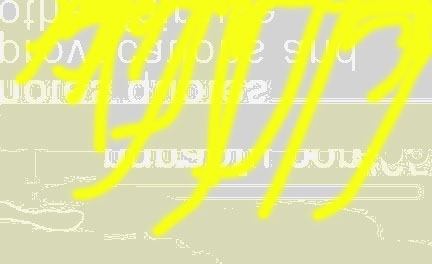
|


